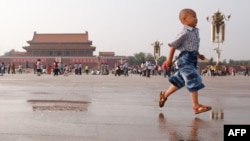The United States has called on authorities in China to release all prisoners who are still being held for their participation in the 1989 Tiananmen Square demonstrations and do more to protect the universal human rights of its citizens.
In a State Department statement Sunday, deputy spokesman Mark Toner, said the U.S. also encouraged China to provide a full accounting of all of those killed, detained or missing during the violent suppression of the demonstrations. It also called for an end to what it described as the continued harassment of participants in the protests and their families.
On June 4, 1989, Chinese troops backed by tanks moved in to crush a student led demonstration centered in Beijing's Tiananmen Square. The crackdown triggered worldwide condemnation and estimates of those killed range from several hundred to several thousand people.
China still considers the incident a "counter-revolutionary rebellion" and has never admitted any wrongdoing in its handling of the uprising. The topic is banned from state media and while the subject is taboo in China, some activists have gathered to mark the anniversary.
The overseas dissident website www.molihua.org which in Chinese means Jasmine, recently urged those who are opposed to the crackdown to dress in black and "stroll" in public places in China on June 3 and 4th to mark the anniversary.
Hu Ping, the chief editor of Beijing Spring, a Chinese-language magazine that focuses on the promotion of human rights, democracy and social justice in China. He says that one of the lessons he learned from the Tiananmen protests was that popular social movements need to have the capability to push ahead at times and pack up when necessary.
If not, he said, they are like a car with only a gas pedal and no brakes.
“China’s authoritarian rule is a reality and it’s under that reality that protests take place there. The only thing that we can do to improve social movements is look to ourselves and find what works and what does not. Although China is a very different place now than it was 23 years ago, the question of how one can make social movements, street protests, or any other type of social movement more effective is one we continue to face," he said.
Wang Dan, a student leader during the Tiananmen protests, marked the anniversary of the crackdown on Saturday, along with Hu Ping and other well Chinese activists. Wang says that if something similar were to take place in China again, more support from within the Communist Party is needed.
"When we were students, when we launched the student movement, we really wanted the movement to be very pure, we didn't want any interference. But I think this is a lesson we should learn. Next time, if we have a second chance, I think we need more cooperation with insiders, with reformers inside the Communist Party. That's very important," he said.





